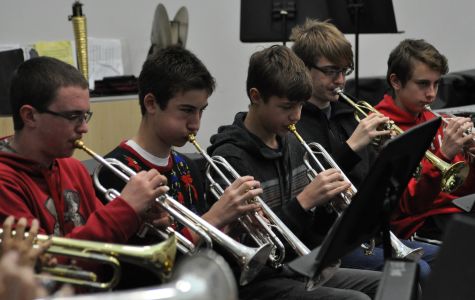Musical training increases brain activity, success

Trumpets practice in band
Many see music as being just an extra activity that gets their kid out of the house and involved, but is another benefit besides it just being an extra activity. This reason is music helping brain growth and development, promoting success in everyday life. Aside from just participating in musical training having effects on everyday life, it has been used for medical needs and therapy.
When learning through music, it opens up different neurons and cognitive mechanisms in the brain. When this effect is put on children, both their memory, comprehension, and literacy skills are increased by around 40%, as shown by Auditory Neuroscience Laboratory at Northwestern University. A child’s ability to read and recognize words and passage is proven to directly correlate with music being involved in their daily life or learning process.
As an adult, if music was involved throughout their childhood, your brain activity and reaction rate is much faster than if no musical training was taken early in life. Through a study done by the Journal of Neuroscience, they showed that the cognitive declines of old age were decreased and sometimes non existent when musical train had been acquired as a child.
Music has been used as therapy for many, because of the brain growth and development caused when music is involved in your daily life. Used on many from special needs students to military veterans to the physical and mental health of the elderly. The American Music Therapy Association shows that when recovering patients from Post-Traumatic stress disorder, they have every four out of five patients recover successfully.
Improving both brain activity and growth, musical training increases overall performance in the daily life, as well as mental health when trying to recover from many forms of mental damage.

